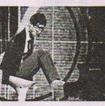“Everything happens for the best,” my grandmother said whenever things weren’t going my way. “Don’t worry, one day your luck (1) _____________(change). ”Gran-九年级英语
题文
“Everything happens for the best,” my grandmother said whenever things weren’t going my way. “Don’t worry, one day your luck (1) _____________(change). ” Grandmother was right, as I discovered after graduating from college. I had decided to be sports announcer (广播员) in a radio station, so I (2) _____________ ( go) to Shanghai and knocked on the door of every station. But I got refused every time. In one station, a kind lady said my problem was short of experience. “ Get some work with a small station and (3)_______________(work) your way up ,” she said. I couldn’t get a job there, either. Then my dad told me a businessman had opened a company and needed someone (4 )_____________ ( manage) the sports center. But again, I didn’t get the job. I felt really down. “Your luck will change,” Granny reminded me. I tried another radio station in Beijing. But the owner, a nice man, told me he already had someone. As I left his office, I asked, “ How can someone be a sports announcer if he ( 5 )_____________(not, get) a job in a radio station?” I ()______________( wait) for the elevator when I heard the man call, “What was that you said about sports? Do you know anything about football?” I (7)______________(put) in front of a microphone and asked to imagine I was commenting (评论) on a football game. “Now you (8)____________ (watch) the football game between Lu Neng and Shen Hua. . . ” On my way home, Granny’s words came back to me, “One day your luck will change, boy. And when it (9 ) ____________( happen) , it’ll feel twice as good because of all the disappointment (失望) you (10) ____________ ( have) . ” At that moment I knew just what she meant. |
答案
【小题 1】 will change 【小题 2】 went 【小题 3】 work 【小题 4】to manage 【小题 5】 can’t get 【小题 6】 was waiting 【小题 7】was put 【小题 8】are watching 【小题 9】happens 【小题 10】have had |
【小题 1】考查时态:时间是one day用一般将来时 will change 【小题 2】这段是描写过去的事情,用过去时:went 【小题 3】这是祈使句:和get并列的是work 【小题 4】考查词组:need sb to do需要某人做….,填to manage 【小题 5】考查情态动词:如果一个人不能在电台工作,他怎么能成为优秀的体育播音员呢?can’t get 【小题 6】我正在等电梯,这时听见一个人打电话:用过去进行时was waiting 【小题 7】考查时态语态:I和put是被动关系,用过去时的被动:was put 【小题 8】时间是:now用现在进行时:are watching 【小题 9】when引导的时间状语从句,不能用一般将来时,用一般现在时代替:happens 【小题 10】因为你体会过的所有的失望,这种感觉会加倍的好:用现在完成时:have had |
据专家权威分析,试题““Everything happens for the best,” my grandmother said whene..”主要考查你对 物主代词,单词、词组 等考点的理解。关于这些考点的“档案”如下:
物主代词单词、词组
考点名称:物主代词
- 物主代词:
表示所有关系的代词叫做物主代词,也叫人称代词的所有格。
物主代词分为形容词性物主代词和名词性物主代词两种。
物主代词有人称和数的变化。第三人称单数的物主代词还有性别的变化。 物主代词的用法:
物主代词既有表示所属的作用又有指代作用,例如:
John had cut his finger; apparently there was a broken glass on his desk.
约翰割破了手指,显而易见,他桌子上有个破碎的玻璃杯。
物主代词有形容词性(my, your等)和名词性(mine, yours等)两种:
形容词性的物主代词属于限定词。
名词性的物主代词在用法上相当于省略了中心名词的 -'s属格结构,例如:
Jack's cap 意为 The cap is Jack's.
His cap 意为 The cap is his.形容词性物主代词用法:
1. 形容词性物主代词相当于形容词,在句中只能用作定语,后面必须跟名词。名词性物主代词常用来避免和前面已提及的名词重复。
相当于【形容词性物主代词+名词】。例如:
Is that yourbike? 那是你的自行车吗?
My pen is quite different from his.
2. 如果名词前用了形容词性物主代词,就不能再用冠词(a, an, the)、指示代词(this, that, these, those)等修饰词了。例如:
这是他的书桌。This is his desk.
3. 与形容词一起修饰名词时,形容词性物主代词要放在形容词的前面。例如:
his English books他的英语书。
their Chinese friends他们的中国朋友。
4. 汉语中经常会出现"我妈妈","你们老师"等这样的语言现象,虽然代词用的是"我"、"你们",但实际意义仍是"我的"、"你们的",
所以在英译时,注意要用形容词性物主代词"my","your"。
例如:你妈妈在家吗?
误:Is you mother at home?
正:Is yourmother at home?
5. it's与its读音相同,he's与his读音相似,但使用时需注意它们的区别(it's和he's分别是it is和he is的缩略形式,但its 和his 却是形容词性物主代词) 。
例如: It's a bird. Its name is Polly. 它是一只鸟。它的名字叫波利。
He's a student. His mother is a teacher. 他是一名学生。他妈妈是一位教师
口诀:
有“名”则"形“,无“名”则“名”。
意思是:后面是名词的话,前面就要用 形容词性物主代词。后面没有名词的话,就用名词性物主代词。名词性物主代词的句法功能:
a. 作主语,例如:
May I use your pen? Yours works better.
我可以用一用你的钢笔吗? 你的比我的好用。
b.作宾语,例如:
I love my motherland as much as you love yours.
我爱我的祖国就像你爱你的祖国一样深。
c.作介词宾语,例如:
You should interpret what I said in my sense of the word, not in yours.
你应当按我所用的词义去解释我说的话,而不能按你自己的意义去解释。
d.作主语补语,例如:
The life I have is yours. It's yours. It's yours. 我的生命属于你,属于你,属于你。
名词性物主代词可以用在介词of的后面,相当于“of+名词所有格”。
口诀
有“名”则"形“,无“名”则“名”。
注:
后面是名词的话,前面就要用 形容词性物主代词。
后面没有名词的话,就用名词性物主代词.形容词性物主代词与名词性物主代词的区别:
一.形容词性物主代词起形容词的作用,用在名词前。
例:
1. This is my book.这是我的书。
2. We love our motherland.我们热爱我们的祖国。
二.名词性物主代词起名词的作用。
例:
1. Look at the two pencils. The red one is yours and the blue one is mine.
看那两支铅笔,红的是你的,蓝的是我的。
2. He likes my pen. He doesn't like hers.
他喜欢我的钢笔。不喜欢她的。
3. 注意:在使用名词性物主代词时,必须有特定的语言环境,也就是要省略的名词。
- 最新内容
- 相关内容
- 网友推荐
- 图文推荐
| [家长教育] 孩子为什么会和父母感情疏离? (2019-07-14) |
| [教师分享] 给远方姐姐的一封信 (2018-11-07) |
| [教师分享] 伸缩门 (2018-11-07) |
| [教师分享] 回家乡 (2018-11-07) |
| [教师分享] 是风味也是人间 (2018-11-07) |
| [教师分享] 一句格言的启示 (2018-11-07) |
| [教师分享] 无规矩不成方圆 (2018-11-07) |
| [教师分享] 第十届全国教育名家论坛有感(二) (2018-11-07) |
| [教师分享] 贪玩的小狗 (2018-11-07) |
| [教师分享] 未命名文章 (2018-11-07) |


![—______ is Jenny.—I’m Gina. Nice to meet you.[ ]A. I’mB. His nameC. I’mD. My name-七年级英语](http://www.00-edu.com/d/file/ks/4/2/wuzhudaici/2019-11-29/small48b153aa794daeb090c5d2505d5cbbac1575042450.png)



